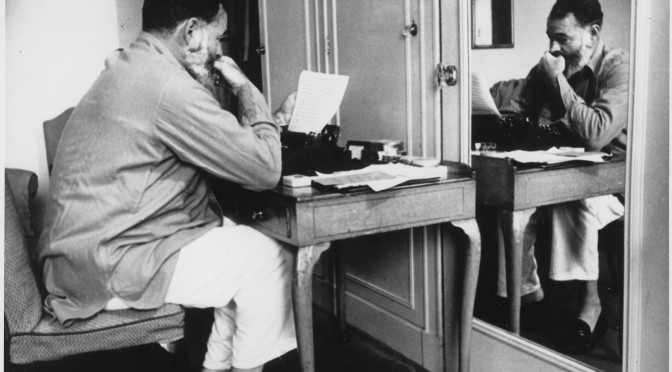As I enter the Metra train to commute back home, I look for a train-car that is not noisy or smells like a fast food order. Once I find my Goldilocks car, I am ready to sit down and begin writing a reflection for one of my classes. I put my headphones on, and open my notebook. For the next forty minutes, I enter a zen-like state of scribbling, crossing out, and thinking.

At the Writing Center, we emphasize how there is no universal writing process that all writers use, which is one of our Core Beliefs. The processes writers use to create a text cannot be distilled into a few steps. While there are several parts to a writer’s process, an oft-forgotten one is where a writer writes.
Where we write matters because the environment around us can affect how and what we write. If someone writes somewhere with a lot of distractions, they can lose focus on what they are writing. Even if a writer is talented in drowning out distractions, will they write as well in a distracting environment as they could in a distraction-free zone? Probably not.
The best place to write may be one that will enable a writer to enter and stay in that zen-like state of flow. This flow allows the words to escape onto the page or screen easily. The best place could be one the writer constructs, one with good music, a cup of coffee, and a comfy chair. Or outside somewhere, enjoying the sunshine and background noise of the city, or waves at the beach. Or whatever works for you.
While writing on the train may not be my favorite place for me to write, it works for me because I am used to riding the Metra as part of my daily routine. The sounds of the train do not distract me as they did when I began commuting to DePaul several years ago. If certain sounds or visuals are part of a writer’s routine, being in that environment with those familiar stimuli may help them enter into a state of flow conducive to writing.
Psychologist Mihaly Csikszentmihalyi argues that flow, the state of mind when a person is completely absorbed in an activity, leaves people in their happiest state. According to Csikzentmihalyi, flow happens when “Your whole being is involved, and you’re using your skills to the utmost.”
Finding a suitable place to write can help a writer enter a state of flow. Many famed authors had a certain desk, room or area to write their work. For example, the early 20th century author Flannery O’Connor wrote much of her famous work in her Georgia home called Andalusia; the rolling hills around the house often inspired her. Some people like having a view for when they write, whether that be a painting or a window. Others may like a place to write with as few visual distractions as possible. This is why some may write in a small quiet room, like a study room in the Richardson Library at DePaul.

So the next time you write, consider how you can change your immediate area to improve your writing process. What makes for a nice place to write for you? Where do you like to write? I would love to hear your thoughts in the comments.
Discover more from UCWbLing
Subscribe to get the latest posts sent to your email.


One reply on “Where We Write Matters”
Great post, Donovan! I used to commute to DePaul during my first two years here, so I can totally relate to the dilemma in your opening (I’ll spare you the details, but suffice it to say I tended to avoid the guy ripping into an MGD six pack on the ride home!) Anyway, I totally agree that certain environments are more conducive to reaching your zen state/getting into flow while writing. I also wonder if certain environments are best for free writing while others might be better for revising. Perhaps some are even better for creative writing while others could be better for writing essays…hmm. Anyway, cool post!